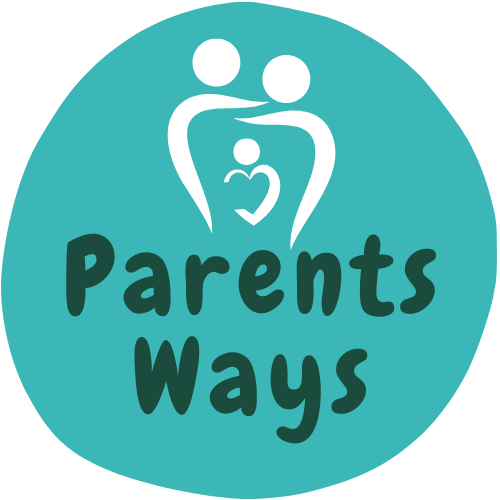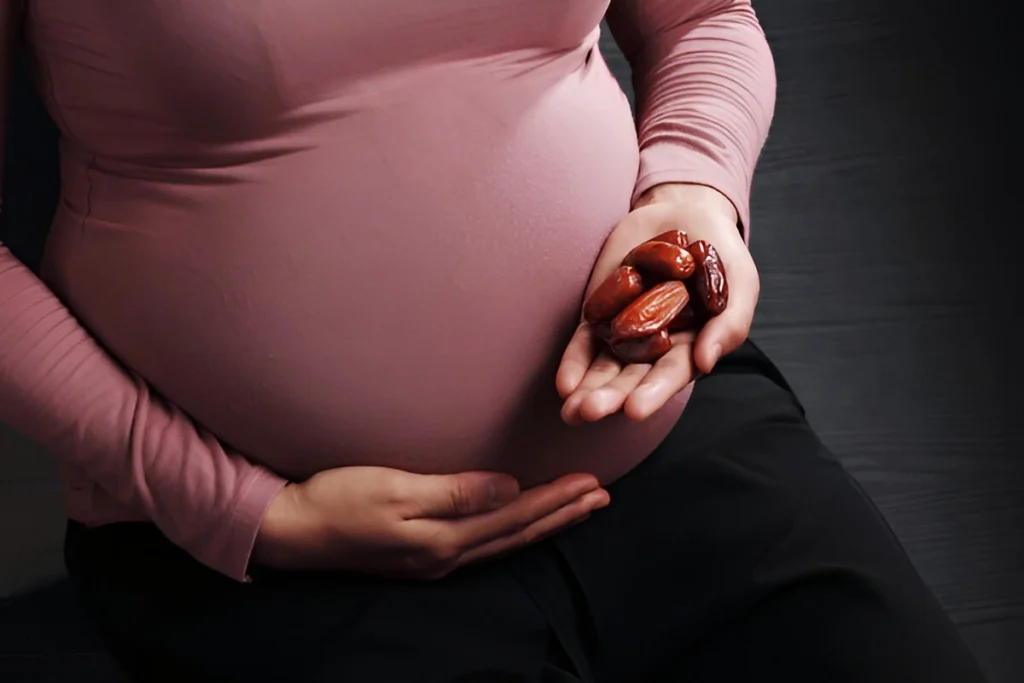Pregnancy is a time of change, excitement, and many questions, especially about diet. Maintaining proper nutrition is paramount for expectant mothers, but knowing what’s beneficial and what’s not can be overwhelming.
One food that stands out is dates, the sweet, energy-packed fruit that has been part of human diets for millennia. But can you eat dates while pregnant? What makes them unique, and are there any downsides to eating them?
In this comprehensive guide, we’ll dive into the benefits, risks, myths, and best practices surrounding eating dates while pregnant. Whether in your first trimester or preparing for labor, dates can be a game-changer for you and your baby.
Table of Contents
What Are Dates?
History and Origins of Dates
Dates have been cultivated for over 6,000 years, making them one of the oldest domesticated fruits. Originating from the Middle East, the date palm (Phoenix dactylifera) has long been revered as the “tree of life” for its ability to provide sustenance in harsh desert climates.
The fruit’s historical significance spans cultures and religions. In Islamic tradition, dates are considered sacred and are often consumed to break fasts during Ramadan.
Popular Types of Dates Worldwide
The world of dates is diverse, with over 200 varieties cultivated globally. Among the most popular are:
- Medjool Dates: Large, soft, and caramel-like, often called “nature’s candy.”
- Deglet Noor Dates: Known for their firm texture and nutty sweetness, they are commonly used in baking.
- Ajwa Dates: Prized in the Middle East for their purported medicinal properties.
- Barhi Dates: Soft, delicate, and honey-flavored, often eaten fresh.

These varieties differ in size, sweetness, and texture but offer similar nutritional benefits.
Can You Eat Dates While Pregnant?
Dates and Pregnancy
Studies highlight the unique relationship between dates and pregnancy, especially during the third trimester. Regularly consuming dates can help prepare the body for labor by promoting cervical ripening and reducing the need for medical induction. This natural process can lead to shorter labor durations and a smoother delivery experience.
Incorporating dates and pregnancy into your daily routine is easy. Whether eaten as a snack, blended into smoothies, or added to meals, dates are a delicious way to nourish your body and support your growing baby. For centuries, cultures around the world have celebrated the connection between dates and pregnancy, making them a timeless superfood for expectant mothers.
Are Dates Safe During Pregnancy?
Yes, it’s safe to eat dates during pregnancy. In fact, they are often recommended for their nutritional value and potential benefits in labor preparation. Packed with vitamins, minerals, and fiber, they can support the increased nutritional demands of pregnancy.
However, as with any food, moderation is key. Eating too many dates may lead to excessive calorie or sugar intake, which could contribute to gestational diabetes or weight gain.
How Many Dates Should Pregnant Women Eat?
Experts suggest consuming about 4-6 dates daily, particularly in the third trimester. This amount provides essential nutrients without overwhelming your diet with natural sugars.
Nutritional Benefits of Dates for Pregnant Women
Vitamins, Minerals, and Antioxidants in Dates
Dates are nutritional powerhouses, offering:
- Fiber: Aids digestion and prevents constipation.
- Potassium: Regulates blood pressure and reduces muscle cramps.
- Magnesium: Supports bone health and relieves pregnancy-related aches.
- Iron: Prevents anemia and boosts energy levels.
- Antioxidants: Protect cells from oxidative stress, reducing inflammation.
| Nutrient | Per 100g | Benefits for Pregnancy |
|---|---|---|
| Calories | 277 | Provides sustained energy |
| Carbohydrates | 75g | Fuels body functions and fetal growth |
| Protein | 2g | Supports tissue development |
| Calcium | 64mg | Strengthens bones and teeth |
The Role of Dates in Supporting Pregnancy
Dates offer a unique combination of nutrients that address common pregnancy challenges, such as low energy, constipation, and nutrient deficiencies. They’re particularly beneficial for women in their third trimester, as studies suggest they promote a smoother labor experience.
Why Eating Dates During Pregnancy is Beneficial
Preventing Digestive Issues Like Constipation
Constipation is one of the most common discomforts during pregnancy. Thanks to their high fiber content, dates are a natural laxative, promoting regular bowel movements and improving gut health.
A 100g serving of dates provides 7g of dietary fiber—about 25% of your daily needs. This fiber not only aids digestion but also helps prevent bloating and hemorrhoids.
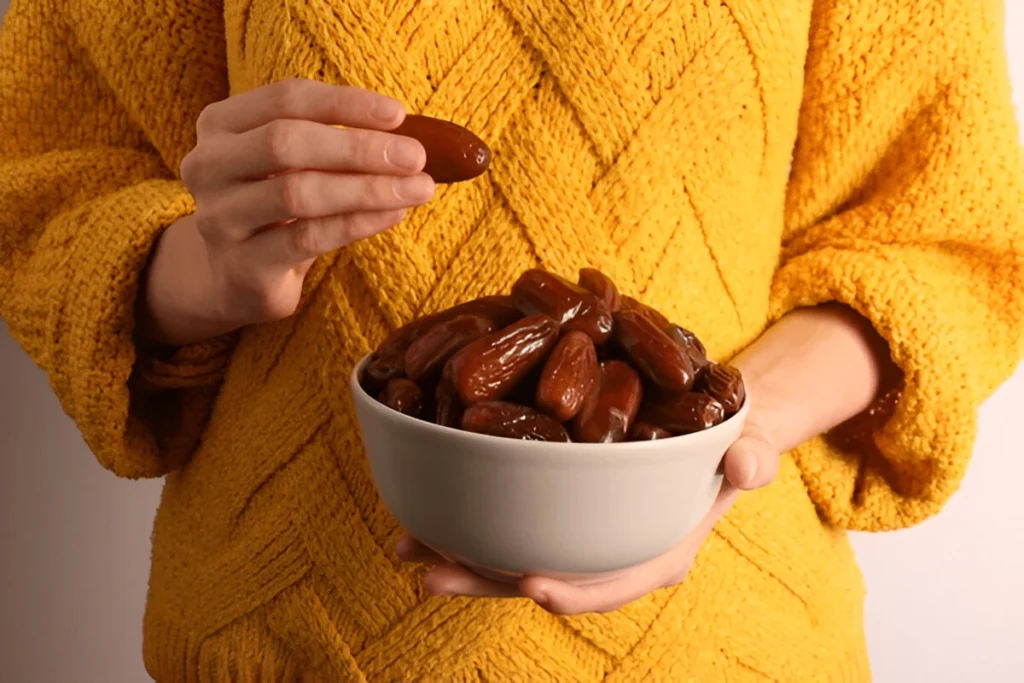
Reducing Labor Time and Promoting Natural Birth
Several studies highlight the role of dates in labor preparation. A study published in the Journal of Obstetrics and Gynecology found that women who ate six dates daily during the last 4 weeks of pregnancy experienced:
- Increased cervical dilation at hospital admission.
- A reduced need for labor induction.
- Shorter labor durations.
These benefits are linked to the natural compounds in dates that mimic the effects of oxytocin, the hormone responsible for uterine contractions.
Common Myths About Dates During Pregnancy
Do Dates Induce Early Labor?
No, eating dates does not induce labor prematurely. They help prepare the body for labor when consumed in the third trimester but won’t cause contractions before your body is ready.
Are Dates Too Sugary for Pregnant Women?
While dates are high in natural sugars, their fiber content helps regulate blood sugar levels, preventing spikes. They’re a much healthier alternative to processed sugary snacks.
When Should You Start Eating Dates for Labor Preparation?
Timing for Labor Support
If you’re in your third trimester, it might be time to consider adding dates to your daily diet. Research suggests that consuming six dates per day starting at 36 weeks of pregnancy can significantly improve labor outcomes.
The reason dates work so well is their ability to enhance cervical ripening. Compounds in dates increase sensitivity to oxytocin, the hormone that triggers contractions, helping to make labor more efficient and potentially reducing medical interventions.
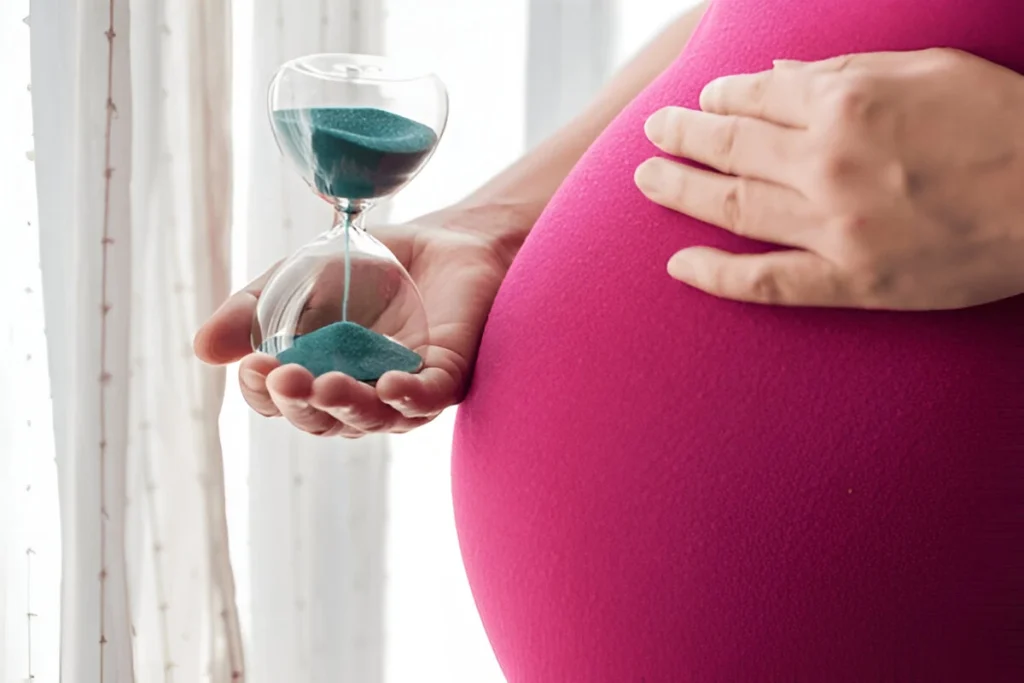
The Recommended Dosage
To reap the benefits, stick to a daily dose of 4-6 dates, which provides around 70-80g of fruit. Spread them throughout the day to avoid overloading on natural sugars. Here’s how you might incorporate them into your routine:
- Morning: Blend dates into your smoothie.
- Afternoon: Enjoy a couple of stuffed dates as a snack.
- Evening: Add chopped dates to your dinner salad or dessert.
Risks and Side Effects of Eating Too Many Dates While Pregnant
Possible Complications
While dates are nutritious, overconsumption can lead to potential issues:
- Excess Weight Gain: Dates are calorie-dense, and eating too many can contribute to unwanted pregnancy weight gain.
- Gestational Diabetes Risk: Though their glycemic index is low, consuming dates in excess may still impact blood sugar levels, especially for women predisposed to diabetes.
- Diarrhea: Their natural laxative effect might cause digestive discomfort if consumed in large quantities.
Who Should Avoid Dates?
Certain pregnant women should consult their healthcare provider before adding dates to their diet:
- Those with gestational diabetes or a high risk of developing it.
- Women experiencing severe digestive issues, as the high fiber content may exacerbate symptoms.
- Those advised to limit calorie intake due to excessive weight gain.
Cultural Practices of Eating Dates During Pregnancy
Cultural Perspectives on Dates and Pregnancy in Middle Eastern Traditions
Dates hold a special place in Middle Eastern cultures, particularly during pregnancy and childbirth. In Islamic tradition, they are associated with the story of Mary (Maryam) in the Quran, who ate fresh dates during labor. This has led to the widespread belief that dates ease childbirth.
In many Middle Eastern households, pregnant women are encouraged to consume dates regularly, particularly in the weeks leading up to labor. They’re often incorporated into herbal remedies and traditional postpartum recovery foods.
Adoption of Dates in Western Diets
While dates were once considered an exotic food in Western cultures, their popularity has grown significantly due to the rise of health-conscious eating. Today, many Western women are adopting the practice of eating dates during pregnancy, inspired by both scientific evidence and cultural traditions.
How to Eat Dates While Pregnant
Simple and Delicious Snacks
Dates are versatile and easy to incorporate into your diet. Here are a few snack ideas:
- Stuffed Dates: Fill with almond butter or soft cheese for a nutrient-packed snack.
- Trail Mix: Combine chopped dates with nuts, seeds, and dried fruit for a healthy on-the-go option.
- Date and Yogurt Parfait: Layer dates, yogurt, and granola for a quick breakfast or dessert.
- Date Smoothies: Blend dates with milk, bananas, and a sprinkle of cinnamon.
Healthy Recipes Featuring Dates
Here are some easy-to-make recipes:
- Date Smoothie
- Ingredients: 4 dates, 1 banana, 1 cup almond milk, a pinch of cinnamon.
- Instructions: Blend all ingredients until smooth. Serve chilled.
- No-Bake Date Energy Balls
- Ingredients: 1 cup dates, 1 cup oats, ½ cup almonds, 2 tbsp cocoa powder.
- Instructions: Blend ingredients in a food processor, roll into balls, and refrigerate.
- Date-Infused Oatmeal: Add chopped dates to your morning bowl for a sweet and nutritious boost.
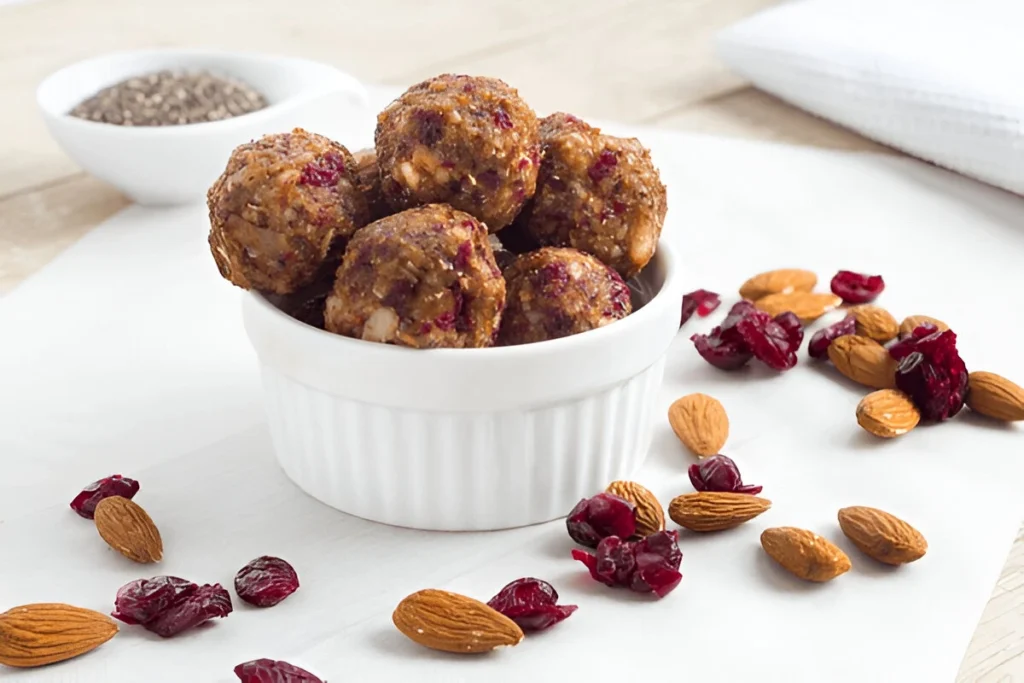
FAQs About Eating Dates While Pregnant
- Can you eat dates while pregnant in the first trimester?
- Yes, but moderation is key. Dates are safe and nutritious in early pregnancy, but they should be consumed in small amounts due to their high sugar content.
- Do dates really help with labor?
- Studies show that dates can promote natural cervical ripening and shorten labor duration when consumed in the last 4 weeks of pregnancy.
- What’s the best type of date for pregnancy?
- Medjool and Ajwa dates are particularly beneficial due to their nutrient density and cultural significance.
- Can eating too many dates cause complications?
- Yes, overconsumption may lead to weight gain, blood sugar imbalances, or digestive discomfort. Stick to 4-6 dates per day.
- When should I start eating dates to prepare for labor?
- Start around 36 weeks of pregnancy, consuming six dates daily for optimal results.
- Can dates replace sugar in recipes?
- Absolutely! Dates are a natural sweetener used in smoothies, baked goods, and desserts as a healthier alternative to refined sugar.
Conclusion: Should You Be Eating Dates While Pregnant?
Incorporating dates into your pregnancy diet is a delicious and nutritious way to support your health and prepare for childbirth. With their impressive array of vitamins, minerals, and antioxidants, dates can help with digestion, provide energy, and even promote a smoother labor experience.
As with any dietary change, consult your healthcare provider to ensure dates fit your unique needs. When eaten in moderation, dates are a natural superfood from which every expectant mother can benefit.
